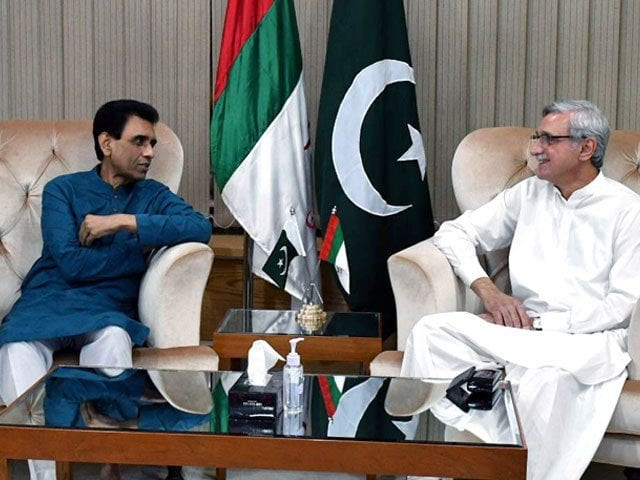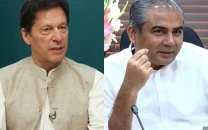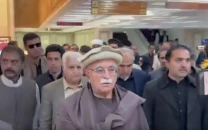MQM support gives PTI required majority in NA
Signs a nine-point MoU with MQM, as the latter formally joins ruling coalition

MQM-P convener Dr Khalid Maqbool Siddiqui (left) with PTI leader Jahangir Tareen. PHOTO: EXPRESS/FILE
This feat has been finally pulled off with the help of five smaller coalition partners and nine independently elected members who have joined the PTI to date.
The party has so far mustered support of 174 members. It claims it is also in talks with other smaller parties and the remaining four independents, hoping they would also lend their help to PTI soon.
Possible alliance between MQM-P, PTI on the cards
According to provisional results available on the Election Commission of Pakistan’s (ECP) website, the PTI has won 116 seats. So far nine independent MNAs – one from Khyber Pakhtunkhwa (K-P), six from Punjab and one each from Sindh and Balochistan – have joined the party, taking its tally to 125.
The PTI will be able to get roughly 26 reserved seats for women in the National Assembly – 15 from Punjab, seven from the K-P and four from Sindh. The PTI is also expected to get some four seats reserved for minorities in the lower house. This brings the party’s total strength to 155 seats.
All five coalition partners – the Muttahida Qaumi Movement (MQM), the Pakistan Muslim League (PML-Q), the Grand Democratic Alliance (GDA), the Balochistan Awami Party (BAP) and the Awami Muslim League (AML) – will bring with them 19 seats – 17 general seats and two seats reserved for women.
It will take coalition government’s grand total to 174 thus allowing it to claim simple majority.
Talking to media persons, senior PTI leader Jahangir Khan Tareen has said the PTI is also in contact with two independent MNAs from the former Federally Administered Tribal Areas (Fata) and one from Sindh. “Talks are also under way with the Balochistan National Party and the Jamhoori Watan Party,” he said.
The PTI information secretary Fawad Chaudhry also voiced hope that till the day of the prime minister’s election the party will have support of 180 MNAs.
PTI to pick 25 NA seats reserved for women
Vote for PM
The PTI has attained simple majority at the Centre but on the day of voting for the next prime minister, the current number 174 will reduce to 167 given the fact that all those MNAs-elect belonging to the PTI-led ruling coalition who have won multiple seats will have to retain only one seat and vacate the others.
The PTI supremo Imran Khan will vacate four seats while Tahir Sadiq, Ghulam Sarwar Khan and Pervaiz Elahi will vacate one seat each. Subsection 4 of Article 91 describes criteria to elect a PM. It says: “The PM shall be elected by the votes of the majority of the total membership of the National Assembly.”
The total membership of the National Assembly is 342 and the majority can be attained by securing the support of 172 MNAs. However, it does not mean that if one fails to get a simple majority, they cannot become the prime minister.
Imran Khan seventh most followed world leader on Twitter
“Provided that, if no member secures such (simple) majority in the first poll, a second poll shall be held between the members who secure the two highest numbers of votes in the first poll and the member who secures a majority of votes of the members present and voting shall be declared to have been elected as Prime Minister,” it reads. Given the situation the PTI still needs votes of five MNAs if it wanted to elect next PM through the simple majority vote.
Punjab Assembly
The PTI is in a relatively comfortable position to form a majority government in Punjab after the inclusion of 22 MPAs-elect from the province, whose names have officially been released by the PTI.
In the election, the PTI secured second highest number of Punjab assembly seats – 123. With the joining of 22 MPAs the party’s tally has reached 145.
While simple majority in Punjab is attained with the support of 149 directly elected MPAs. Here the PML-Q is a partner and it has eight seats, seven won by itself and an independent MPA who later joined it. The BAP has also won one seat from Punjab. The PTI-led coalition’s grand total in Punjab is 154.
MoU singed with MQM
A special federal financial package for urban Sindh, police and local government reforms, merit based appointment in government sector and revision of the ongoing operation in Karachi are some of the key points of an agreement signed between the PTI and the MQM, ahead of formation of new government.
After signing this nine-point memorandum of understanding (MoU), the MQM has formally joined the PTI-led coalition government at the Centre.
The PTI has also agreed to conduct audit of elections in select constituencies of Karachi where the MQM candidates had to face defeat. “It is agreed in line with the statement given by the PTI chief Imran Khan that election audit will take place of any of the constituencies pointed out by the MQM-P,” reads MoU.
Both parties have also agreed to implement immediately the resolution passed by the previous National Assembly regarding Karachi’s census and a decision taken by the Council of Common Interest (CCI).
“The Karachi operation shall be reviewed in totality and in consultation with all stakeholders. All parties should have a level playing field,” it adds. Another MQM demand calls for merit based appointments in government jobs and construction of a university in Hyderabad.
The PTI also agreed that next federal government would give a special financial assistance package for urban Sindh including Karachi. The parties also agreed to introduce reforms in local government and police as implemented by the last the PTI government in the K-P.
The MoU was on Friday by the MQM’s Faisal Sabzwari and the PTI’s Dr Arif Alvi. Later addressing a joint press conference, senior PTI leader Jahangir Khan assured that all the demands mentioned in the MoU would be implemented in letter and spirit.
The MQM leader Khalid Maqbool Siddiqui said he visited Bani Gala on Imran Khan’s invitation. He said all the agreed points were according to Constitution and needs of the people of Sindh.
He said the MQM and the PTI agreement would strengthen democracy in the country. “The census issue is very important to the MQM and the PTI has assured that it will be looked into,” he added.


















COMMENTS
Comments are moderated and generally will be posted if they are on-topic and not abusive.
For more information, please see our Comments FAQ